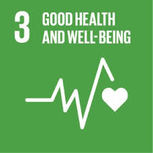New report from SERAF:
Alcohol use - a barrier to health and to the achievement of the SDGs
Alcohol is a barrier to achieving both good and equitable health, on a global scale. Targets 3.4 and 3.5 of the third Sustainable Development Goal will not be achieved without addressing alcohol use. This is the conclusion of a newly published report written by SERAF, The Norwegian Centre for Addiction Research.
 The SERAF report with the title “Alcohol and Global Health” is co-published with FORUT. It starts out by pointing at the fact that seen as a whole, good health is spreading. “People are living longer and entire populations are ageing, and with more healthy years. Infant mortality has decreased by 37% since 2000, early childhood mortality by 44%, and new HIV cases by 35%”.
The SERAF report with the title “Alcohol and Global Health” is co-published with FORUT. It starts out by pointing at the fact that seen as a whole, good health is spreading. “People are living longer and entire populations are ageing, and with more healthy years. Infant mortality has decreased by 37% since 2000, early childhood mortality by 44%, and new HIV cases by 35%”.
In spite of this, improved health is not being enjoyed universally or equally: health inequities are indeed increasing, both within and across countries. The report points at social determinants as one explanation of the inequities in health. These conditions in which individuals are born, grow, live, work, and age, are for the most part beyond the reach of a single individual to correct.
Another explanation is of a clearly political character: “Neoliberal reforms emphasizing individual responsibility for health, de-regulation, and reliance on the private market rather than the welfare state to provide appropriate health ser-vices to all, have all weakened states’ abilities to address social determinants of health”.
 In the report the authors, Dr. Ley Muller and Prof. Thomas Clausen (picture right), discuss global health and alcohol-related harm linked to the Sustainable Development Goals (SDGs) from the perspective that the SDGs are powerful indicators of a global commitment to social justice.
In the report the authors, Dr. Ley Muller and Prof. Thomas Clausen (picture right), discuss global health and alcohol-related harm linked to the Sustainable Development Goals (SDGs) from the perspective that the SDGs are powerful indicators of a global commitment to social justice.
Sustainable Development Goal 3 aims for good health in the broadest and most equitable sense. Within this goal, targets 3.4 and 3.5 involve reduced mortality from non-communicable diseases and suicide, improved mental health and well-being, a reduction in harmful alcohol use, and in-creased treatment coverage for alcohol use disorders. The SERAF/FORUT report reviews the current evidence regarding alcohol’s impact on these two targets.
The conclusion is very clear and stand out as a big challenge for governments all over the world: “Alcohol is a barrier to achieving both good and equitable health, on a global scale. Targets 3.4 and 3.5 of the third Sustainable Development Goal will not be achieved without addressing alcohol use”.
The new report also forms the technical basis for a new campaign by four Norwegian NGOs; FORUT, IOGT Norway, Juvente and Blue Cross. The campaign challenges Norwegian politicians to divest funds from the so-called “Oil Fund” in multinational alcohol companies. One of the campaign slogans read “Probably not the most ethical investment in the world”.
RELATED ARTICLES
- New report highlights benefits of policy measures to prevent harmful alcohol consumption
- Alcohol obstacle to development
- Government investments in alcohol industry up against the wall
- Abstracts for GAPC 2020 – deadline 29 July 2019
- A regional African alcohol coordination mechanism is needed
- New book reveals a series of unethical business practices by Heineken in Africa
- Next GAPC to be held in Dublin in March 2020
- SAFER – a new WHO initiative to boost national alcohol policy processes
- Trouble Brewing
- WHO Launches Global status report on alcohol and health 2018

